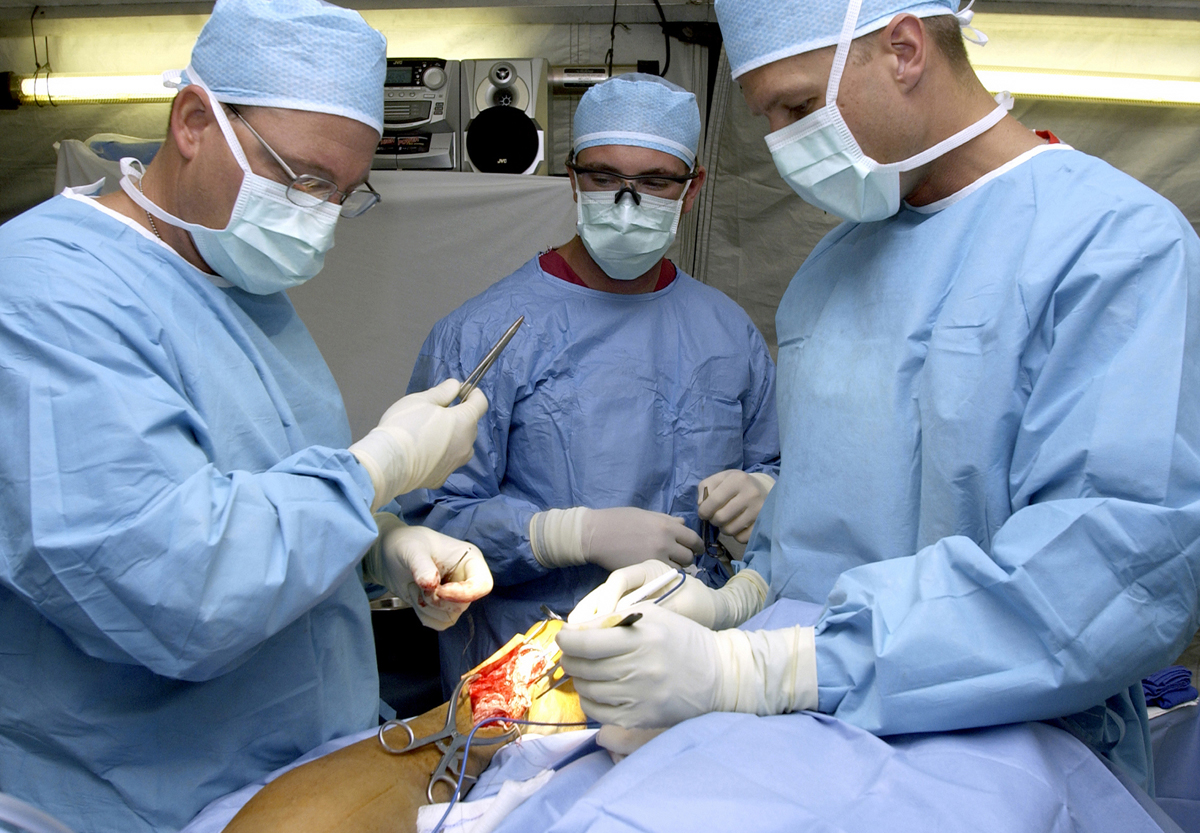Surgery
(Redirected from Postoperative)
Editor-In-Chief: Prab R Tumpati, MD
Obesity, Sleep & Internal medicine
Founder, WikiMD Wellnesspedia &
W8MD medical weight loss NYC and sleep center NYC
Surgery
| Country or region | |
|---|---|
| Country | |
| Ethnic group | |
| Regional varieties | |
| National dish | |
| National dishes | |
| National drink | |
| National drinks | |
| See also |
Surgery represents a critical branch of medicine that focuses on treating diseases, injuries, and malformations through manual and instrumental techniques. Individuals who master these techniques and apply them professionally are known as surgeons.
History of Surgery[edit | edit source]
Surgery traces its roots back to the Neolithic Age (approximately 10,000 to 6,000 BC). The first surgical procedures were simple and lacked the advanced tools and detailed understanding of human anatomy that characterize modern surgical practice.
One of the earliest documented surgical procedures, trepanning or trepanation, involved creating an opening in the skull to alleviate intracranial pressure or address other neurological complications. Archaeological evidence suggests that trepanning might have been performed as early as 8,000 BC.
Surgical Specialties[edit | edit source]
Surgery is a broad discipline that spans numerous specialties, each concentrating on specific body systems or types of procedures. Here are some of the main surgical specialties:
- General surgery: This specialty covers a wide range of surgical procedures performed on various body parts.
- Cardiothoracic surgery: Focuses on surgical interventions involving the heart and chest.
- Neurosurgery: Specializes in surgical procedures on the nervous system, including the brain and spinal cord.
- Orthopedic surgery: Concerned with surgical procedures related to the musculoskeletal system.
- Plastic surgery: Involves surgical repair or reconstruction of physical deformities or aesthetic enhancements.
Education and Training[edit | edit source]
The journey to becoming a surgeon requires extensive education and rigorous training. It generally includes earning a bachelor's degree, completing four years of medical school, and undertaking a surgical residency that can last between five to seven years, depending on the specialty. Some surgeons choose to further their expertise through fellowship training in a subspecialty.
Risks and Ethics[edit | edit source]
Surgery, like all medical procedures, carries certain risks, including infection, bleeding, and complications related to anesthesia. The potential benefits of a surgical procedure must always be weighed against these potential risks.
The surgical profession is also guided by a stringent code of ethics, which mandates surgeons to act in their patients' best interests, respect patient autonomy, and strive for justice in the distribution of health resources.
Orthopedic Surgical Procedures[edit | edit source]
Orthopedic surgery involves procedures related to the musculoskeletal system. Some of the orthopedic surgical procedures include:
- ankle replacement
- anterior cruciate ligament reconstruction
- arthrodesis
- arthroplasty
- arthroscopy
- arthrotomy
- bone grafting
- bunion surgery
- carpal tunnel release
- hip replacement
- knee replacement
- laminectomy
- rotator cuff repair
- spinal fusion
Notable Surgeons[edit | edit source]
Numerous surgeons have made significant contributions to the field of surgery. Some of the most notable ones include:
- David Hayes Agnew
- Christiaan Barnard
- Norman Bethune (1890-1939), battlefield surgery.
- Theodor Billroth, stomach resection
- Ben Carson
- William Cheselden
- Realdo Colombo (c. 1516-1559)
- Abraham Colles (1773-1843)
- Astley Cooper
- Michael E. DeBakey
- William deVries
- Cornelius Fred
- William Jardine
- Walter Karl Koch
- Joseph Lister
- Robert Liston
- Sushruta
- Ferdinand Sauerbruch, thoracic surgery
- George H. Tichenor
Dictionaries and Glossaries[edit | edit source]
For a more comprehensive understanding of surgical terms and procedures, refer to:
See Also[edit | edit source]
- Medicine, Biomaterial
- General Surgery, Plastic Surgery, Abdominal Surgery, Laparoscopic Surgery, Traumatology, Sexual Reassignment Surgery, Dental Surgery
- List of Surgical Procedures
| This article is a medical stub. You can help WikiMD by expanding it! | |
|---|---|
Search WikiMD
Ad.Tired of being Overweight? Try W8MD's physician weight loss program.
Semaglutide (Ozempic / Wegovy and Tirzepatide (Mounjaro / Zepbound) available.
Advertise on WikiMD
|
WikiMD's Wellness Encyclopedia |
| Let Food Be Thy Medicine Medicine Thy Food - Hippocrates |
Translate this page: - East Asian
中文,
日本,
한국어,
South Asian
हिन्दी,
தமிழ்,
తెలుగు,
Urdu,
ಕನ್ನಡ,
Southeast Asian
Indonesian,
Vietnamese,
Thai,
မြန်မာဘာသာ,
বাংলা
European
español,
Deutsch,
français,
Greek,
português do Brasil,
polski,
română,
русский,
Nederlands,
norsk,
svenska,
suomi,
Italian
Middle Eastern & African
عربى,
Turkish,
Persian,
Hebrew,
Afrikaans,
isiZulu,
Kiswahili,
Other
Bulgarian,
Hungarian,
Czech,
Swedish,
മലയാളം,
मराठी,
ਪੰਜਾਬੀ,
ગુજરાતી,
Portuguese,
Ukrainian
Medical Disclaimer: WikiMD is not a substitute for professional medical advice. The information on WikiMD is provided as an information resource only, may be incorrect, outdated or misleading, and is not to be used or relied on for any diagnostic or treatment purposes. Please consult your health care provider before making any healthcare decisions or for guidance about a specific medical condition. WikiMD expressly disclaims responsibility, and shall have no liability, for any damages, loss, injury, or liability whatsoever suffered as a result of your reliance on the information contained in this site. By visiting this site you agree to the foregoing terms and conditions, which may from time to time be changed or supplemented by WikiMD. If you do not agree to the foregoing terms and conditions, you should not enter or use this site. See full disclaimer.
Credits:Most images are courtesy of Wikimedia commons, and templates, categories Wikipedia, licensed under CC BY SA or similar.
Contributors: Prab R. Tumpati, MD


















